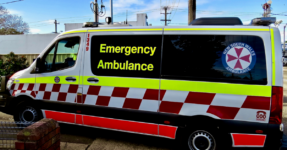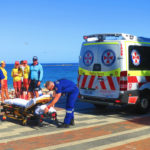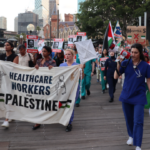Law, Penalties and Defences for Assaulting Frontline Emergency and Health Workers in NSW

New South Wales Police have charged a 31- year old man over allegations he sexually touched and threatened a female paramedic who was trying to help him.
Police allege the incident occurred inside an ambulance on 30 March 2024, while the man was being taken to Nepean Hospital.
The man was arrested at a home in Doonside in Sydney’s western suburbs on 8 April 2024.
The allegations, if substantiated, highlight the difficulties that can be faced by frontline workers, including those who are unarmed and required to respond to situations that can put their safety at risk.
Special offences against frontline emergency and health workers
In 2022, the New South Wales Government introduced an amendment to existing legislation, with the objective of providing better protection for emergency frontline and health workers.
The Crimes Legislation Amendment (Assaults on Frontline Emergency and Health Workers) Bill 2022, which came into effect in October of that year, aims to ensure that emergency workers other than police officers, who are already protected by other laws, have better safeguards in place while at work, and introduced higher penalties for anyone who commits an offence against a emergency or health worker.
The new laws were a response to significant disturbing incidents both prior to and during the pandemic which saw frontline workers assaulted in a range of settings.
The New South Wales man accused of falling foul of the law was charged earlier this week with both sexual touching as well as intimidating a frontline health worker.
Offences relating to assaulting frontline emergency and health workers
The amendment Bill of 2022 introduced several offences which are designed to deter and punish assaults and associated conduct against frontline emergency and health workers.
These offences are now contained in section 60AD (frontline emergency workers) and section 60AE (frontline health workers) of the Crimes Act 1900 (NSW).
Who is a frontline emergency worker?
A frontline emergency worker for the purpose of section 60AD of the Act is defined by section 60AAt as:
- a member of an emergency services organisation, within the meaning of the State Emergency and Rescue Management Act 1989 other than the Ambulance Service of NSW and the NSW Police Force, who provides emergency or rescue services, or
- a person employed within either of the following while the person is undertaking firefighting activities:
- the National Parks and Wildlife Service,
- the NSW Forestry Corporation.
Offences against frontline emergency workers in NSW
Section 60AD(1) of the Act makes it an offence punishable by a maximum penalty of 12 months in prison to hinder or obstruct, or incite another person to hinder or obstruct, a frontline emergency worker in the course of the worker’s duty commits an offence.
Section 60AD(2) of the Act prescribes a maximum penalty of 5 years in prison upon any person who assaults, throws a missile at, stalks, harasses or intimidates a frontline emergency worker in the course of the worker’s duty, without causing actual bodily harm.
An ‘assault’ encompasses both causing a person to fear for their imminent safety without touching, as well as what is sometimes referred to as ‘battery’ – which involves unauthorised touching.
Section 60AD(3) of the Act prescribes a maximum penalty of 7 years in prison upon any person who assaults, throws a missile at, stalks, harasses or intimidates a frontline emergency worker in the course of the worker’s duty during a public disorder.
A ‘public disorder’ encompasses a riot or other civil disturbance that gives rise to a serious risk to public safety, whether at a single location or resulting from a series of incidents in the same or different locations, and includes a riot or other civil disturbance at a correctional or detention centre.
Section 60AD(4) of the Act prescribes a maximum penalty of 7 years in prison on any person who assaults a frontline emergency worker in the course of the worker’s duty causing actual bodily harm.
Actual bodily harm is that which is more than ‘transient or trifling’; in other words, more than trivial or passing injury. It can include lasting scratches, bruises and abrasions.
Section 60AD(5) of the Act prescribes a maximum penalty of 9 years in prison on any person who assaults a frontline emergency worker in the course of the worker’s duty during a public disorder and causes actual bodily harm.
Section 60AD(6) of the Act prescribes a maximum penalty of 12 years in prison on any person who wounds or causes grievous bodily harm to a frontline emergency worker in the course of the worker’s duty in circumstances where the person intends to cause such harm or is reckless in that regard.
A wound is the breaking of both layers of the skin, being the dermis and epidermis, and includes a ‘split lip’.
Grievous bodily harm is ‘really serious harm’ and includes, but is not limited to the destruction of a foetus other than in the course of a medical procedure for the termination of a pregnancy, any permanent or serious disfiguring and any serious bodily disease.
A person is ‘reckless’ if he or she foresaw the possibility of wounding or causing grievous bodily harm but went ahead with the conduct regardless.
And section 60AD(7) of the Act sets down a maximum penalty of 14 years in prison on any person who wounds or causes grievous bodily harm to a frontline emergency worker in the course of the worker’s duty during a public disorder in circumstances where the person intends to cause such harm or is reckless in that regard.
Offences can apply to frontline emergency workers who are not on duty
Section 60AD(8) of the Act makes clear that an action is taken to be carried out in relation to a frontline emergency worker in the course of the worker’s duty, even if the worker is not on duty at the time, if it is carried out:
- as a consequence of, or in retaliation for, actions undertaken by the frontline emergency worker in the course of the worker’s duty, or
- because the worker is a frontline emergency worker.
Who is a frontline health worker?
A frontline emergency worker for the purpose of section 60AE of the Act is defined by section 60AA as:
- a person employed or otherwise engaged to provide medical or other health treatment to patients in a hospital, or in a health institution under the control of a local health district or statutory health corporation under the Health Services Act 1997,
- a member of the Ambulance Service of NSW,
- a person employed or otherwise engaged by the St John Ambulance Australia (NSW) who, in that capacity, provides medical care,
- a member of Hatzolah who, in that capacity, provides medical care,
- a person who is employed or otherwise engaged to provide community first responder services,
- a person employed or otherwise engaged to provide community health services,
- pharmacy staff, or
- a person employed or otherwise engaged to provide security services in a hospital, or in a health institution under the control of a local health district or statutory health corporation under the Health Services Act 1997 .
Offences against frontline health workers in NSW
Section 60AE of the Crimes Act essentially mirrors section 60AD, except for replacing the word ‘emergency’ (in the phrase ‘frontline emergency worker’) with ‘health’ (as in ‘frontline health worker’), which begs the question: why weren’t the offences simply put under a single section using the phrase ‘frontline emergency or health worker’?
In any event, and without repeating the definition outlined above, section 60AE provides as follows:
Section 60AE(1) makes it an offence punishable by a maximum penalty of 12 months in prison to hinder or obstruct, or incite another person to hinder or obstruct, a frontline health worker in the course of the worker’s duty commits an offence.
Section 60AE(2) of the Act prescribes a maximum penalty of 5 years in prison upon any person who assaults, throws a missile at, stalks, harasses or intimidates a frontline health worker in the course of the worker’s duty, without causing actual bodily harm.
This is the section under which the 31-year old man from Doonside has been charged.
Section 60AE(3) of the Act prescribes a maximum penalty of 7 years in prison upon any person who assaults, throws a missile at, stalks, harasses or intimidates a frontline health worker in the course of the worker’s duty during a public disorder.
Section 60AE(4) of the Act prescribes a maximum penalty of 7 years in prison on any person who assaults a frontline health worker in the course of the worker’s duty causing actual bodily harm.
Section 60AE(5) of the Act prescribes a maximum penalty of 9 years in prison on any person who assaults a frontline health worker in the course of the worker’s duty during a public disorder and causes actual bodily harm.
Section 60AE(6) of the Act prescribes a maximum penalty of 12 years in prison on any person who wounds or causes grievous bodily harm to a frontline health worker in the course of the worker’s duty in circumstances where the person intends to cause such harm or is reckless in that regard.
And section 60AE(7) of the Act sets down a maximum penalty of 14 years in prison on any person who wounds or causes grievous bodily harm to a frontline health worker in the course of the worker’s duty during a public disorder in circumstances where the person intends to cause such harm or is reckless in that regard.
Offences can apply to frontline health workers who are not on duty
Section 60AE(8) of the Act makes clear that an action is taken to be carried out in relation to a frontline health worker in the course of the worker’s duty, even if the worker is not on duty at the time, if it is carried out:
- as a consequence of, or in retaliation for, actions undertaken by the frontline health worker in the course of the worker’s duty, or
- because the worker is a frontline health worker.
Legal defences
Legal defences to assault offences and sexual offences, including sexual touching and offences relating to frontline emergency and health workers, include self-defence, duress and necessity.
In the event you are able to raise evidence of a legal defence, the onus then shifts to the prosecution to prove beyond a reasonable doubt that the defence does not apply to the circumstances of the case.
A person is entitled to an acquittal if the prosecution is unable to discharge its onus of proof.
Going to court for an assault offence?
If you have been accused of an offence involving allegations of assault, call Sydney Criminal Lawyers anytime on (02) 9261 8881 to arrange a free first conference with an experienced criminal defence lawyer who will advise you of your options and the best way forward, and fight for the optimal outcome in the circumstances.








